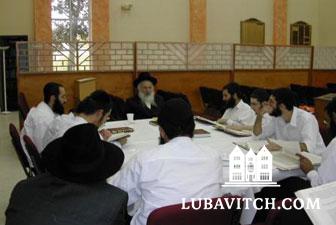(lubavitch.com) As college graduates flung mortarboards skyward and clutched their diplomas in hand, young men from Chabad rabbinicall yeshivas sweated out the demanding oral and written exams that would transform them from yeshiva student to rabbi.
Semicha, (ordination) or the process of attaining rabbinical status, dates back to biblical times – when Moses conferred a new leadership status upon his successor Joshua. Conferring semicha forges a link between one generation of Jewish spiritual and legal guidance and the next. The young men attaining semicha today are being trained in a system that is rigorous and detail laden, traditional and tuned into the real world challenges that face today’s rabbis.
Avi Vishny, a New Yorker now studying in Melbourne, Australia, devotes at least eight hours a day to ready himself for the oral and written tests that will prove that he not only knows the laws down to the details, but can apply them too. Four to eight hours are needed to complete a single test, and the number of tests administered varies according to the yeshiva, but it’s the oral exam or farher that the students say is most nerve wracking.
Vishny is one of hundreds pf Chabad Lubavitch yeshiva students striving to become a rabbi this year. Unlike many other Jewish streams, semicha is obtained by the bulk of Chabad yeshiva students. This trend began in the 1950s when the Lubavitcher Rebbe instructed yeshiva students to obtain ordination before getting married and starting families of their own.
The complexities of running a home in accordance with Jewish law are many, and the Rebbe wished for each home to be guided by one well versed in the points of law, who could answer questions that arose and “knew when a matter was beyond their scope and to seek out more learned counsel,” said Rabbi Chaim Schapiro, Dean of the Rabbinic Ordination program at the Rabbinical College of America in Morristown (RCA), NJ.
As a result, there are Chabad established semicha programs around the world. Enough cities to fill a travelogue are home to Chabad rabbinical ordination programs, large and small. They can be found in Antwerp, Fort Lauderdale, Pretoria, Brooklyn, Miami and Melbourne, with still more in Israel. With 43 students passing the necessary tests, RCA stands out as one of the largest, outside of the program located at Chabad headquarters in Brooklyn, New York.
While program sizes vary, the core of study is nearly universal. Laws regarding forbidden mixtures, koshering processes, and separation of milk and meat are the fundamentals. Others add the laws of Shabbat or how animals are rendered fit for consumption as electives. After years of enjoying the intellectual give and take of Talmudic study, where arguments and counterarguments can go on for pages, Vishny has enjoyed studying for semicha because it addresses practical applications of the Jewish law.
“Learning these laws for semicha has given me the opportunity and motivation to study them in depth,” he said.
Because so many Chabad rabbis go on to lead communities of their own, there has been a movement toward practical rabbinical instruction to go along with the legal studies.
“It is our goal to instill our semicha candidates with a true feeling for the material they are studying,” said Rabbi Moshe Herson, Director of Lubavitch of New Jersey Regional Headquarters. “We want them to know Jewish law as a living experience.”
The quest for hands-on experiences has diversified the learning process. This year’s RCA graduating class sat in on a divorce proceeding, with the permission of all involved parties.
In Machon L’Semicha in Fort Lauderdale, FL, the rabbis-in-training visited a candied fruit processing factory and beverage plants to determine a product’s kosher status. Lessons on the laws of performing marriages, burials, on public speaking and counseling have helped novice rabbis prepare for their futures.
In Yeshiva Gedolah of Melbourne, the students studying in Rabbi Faitel Levin’s program are getting ready to apply their knowledge by observing a local hospital for situations that would require Jewish legal and medico-ethical decisions.
This year’s fourteen students at Machon L’Semicha in Miami Beach, have hewed their leadership skills by running community programs. In the mix of running children’s holiday programs and Shabbat retreats, the Machon L’Smicha group extends itself to the community as only those immersed in Torah study can. Their study hall becomes a community study hall, men and teens from the neighborhood stop in throughout the week to learn in one-on-one sessions with the rabbis in training, according to Rabbi Yisroel Frankforter, director of the Semicha program.
“Being in close contact with rabbinical students enriched our community with the atmosphere of Torah. Learning Torah on a high level is attractive to many members of the community. The community looks up to them,” said Rabbi Frankforter.

Be the first to write a comment.